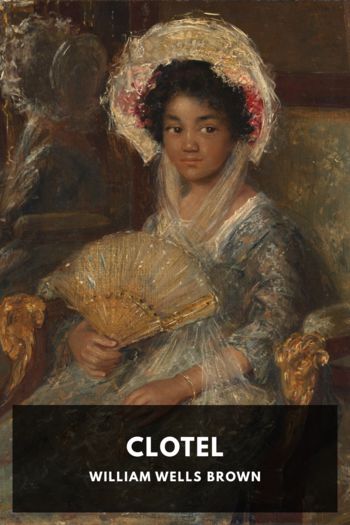Clotel - William Wells Brown (good books to read for beginners txt) 📗

- Author: William Wells Brown
Book online «Clotel - William Wells Brown (good books to read for beginners txt) 📗». Author William Wells Brown
After they had been at St. Louis a few weeks, another cargo of human flesh was made up. There were amongst the lot several old men and women, some of whom had grey locks. On their way down to New Orleans William had to prepare the old slaves for market. He was ordered to shave off the old men’s whiskers, and to pluck out the grey hairs where they were not too numerous; where they were, he coloured them with a preparation of blacking with a blacking brush. After having gone through the blacking process, they looked ten or fifteen years younger. William, though not well skilled in the use of scissors and razor, performed the office of the barber tolerably. After the sale of this gang of negroes they returned to St. Louis, and a second cargo was made up. In this lot was a woman who had a child at the breast, yet was compelled to travel through the interior of the country on foot with the other slaves. In a published memoir of his life, William says, “The child cried during the most of the day, which displeased Mr. Walker, and he told the mother that if her child did not stop crying, he would stop its mouth. After a long and weary journey under a burning sun, we put up for the night at a country inn. The following morning, just as they were about to start, the child again commenced crying. Walker stepped up to her and told her to give the child to him. The mother tremblingly obeyed. He took the child by one arm, as anyone would a cat by the leg, and walked into the house where they had been staying, and said to the lady, ‘Madam, I will make you a present of this little nigger; it keeps making such a noise that I can’t bear it.’ ‘Thank you, sir,’ said the lady. The mother, as soon as she saw that her child was to be left, ran up to Mr. Walker, and falling on her knees, begged of him in an agony of despair, to let her have her child. She clung round his legs so closely, that for some time he could not kick her off; and she cried, ‘O my child, my child. Master, do let me have my dear, dear child. Oh! do, do. I will stop its crying and love you forever if you will only let me have my child again.’ But her prayers were not heeded, they passed on, and the mother was separated from her child forever.
“After the woman’s child had been given away, Mr. Walker rudely commanded her to retire into the ranks with the other slaves. Women who had children were not chained, but those who had none were. As soon as her child was taken she was chained to the gang.”
Some time after this, Walker bought a woman who had a blind child; it being considered worthless, it was given to the trader by the former owner of the woman on the score of humanity, he saying that he wished to keep mother and child together. At first Walker declined taking the child, saying that it would be too much trouble, but the mother wishing to have her boy with her, begged him to take it, promising to carry it the whole distance in her arms. Consequently he took the child, and the gang started on their route to the nearest steamboat landing, which was above one hundred miles. As might have been expected, the woman was unable to carry the boy and keep up with the rest of the gang. They put up at night at a small town, and the next morning, when about to start, Walker took the little boy from its mother and sold it to the innkeeper for the small sum of one dollar. The poor woman was so frantic at the idea of being separated from her only child, that it seemed impossible to get her to leave it. Not until the chains were put upon her limbs, and she fastened to the other slaves, could they get her to leave the spot. By main force this slave mother was compelled to go on and leave her child behind. Some days after, a lady from one of the free states was travelling the same road and put up at the same inn: she saw the child the morning after her arrival, and heard its history from one of the slaves, which was confirmed by the innkeeper’s wife. A few days after, the following poem appeared in one of the newspapers, from the pen of the lady who had seen the blind child:
Come back to me, mother! why linger away
From thy poor little blind boy, the long weary day!
I mark every footstep, I list to each tone,
And wonder my mother should leave me alone!
There are voices of sorrow and voices of glee,
But there’s no one to joy or to sorrow with me:
For each hath of pleasure and trouble his share,
And none for the poor little blind boy will care.
My mother, come back to me! close to thy breast
Once more let thy poor little blind one be pressed;
Once more let me feel thy warm breath on my cheek,
And hear thee in accents of tenderness speak!
O mother! I’ve no one to love me—no heart
Can bear like thy own in my sorrows a part;
No hand is so gentle, no voice is so kind!
Oh!





Comments (0)